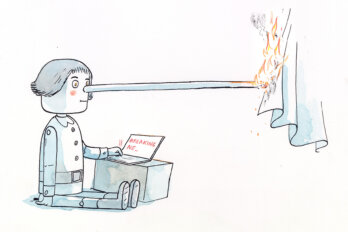Send us a letter, email, or tweet, or post on our Facebook page.
guilty until proven innocent
Justin Ling’s “False Convictions” (November 2022) is a reminder to Canadians that we are still waiting on the federal government to make good on its promise to create a new, independent commission to increase access to justice for the wrongfully convicted. Canada’s wrongful-conviction problem disproportionately impacts our most disadvantaged populations. I am involved in a soon-to-be-launched Canadian registry of wrongful convictions that includes fifteen people who felt they had no choice but to plead guilty, only to have their convictions overturned by new evidence. The majority are women, racialized men, and people with cognitive impairments. They include Richard Catcheway, an Indigenous man who pled guilty in 2017 to a break and enter even though he was imprisoned at the time and it would have been impossible for him to commit such a crime. Even if the justice system got it right 99.5 percent of the time, it would still amount to dozens of wrongful convictions each year that go without remedy. The federal government should implement justices Harry LaForme and Juanita Westmoreland-Traoré’s vision of a proactive and independent commission that has adequate resources to investigate alleged miscarriages of justice and refer meritorious cases back to the courts for correction.
Kent Roach
Toronto, ON
reap what you sow
In “Seeds of Mistrust” (November 2022), J. R. Patterson investigates the disappearance of $500,000 from the municipality of WestLake-Gladstone, Manitoba, insinuating that small municipal government is failing. As a councillor for a Manitoban town myself, I disagree. Elected officials, especially in smaller communities, are the closest to the people, and our decisions are based on what is best for the town or municipality. As the matter of the missing money in WestLake-Gladstone is ongoing, residents should get involved in local government by running for council and voting in order to see action. Patterson implies the problem is hopeless, but apathy means citizens will become more complacent about the mishandling of government affairs.
Walter Badger
Stonewall, MB
missing ingredients
In “Half Baked” (November 2022), Alex Tesar critiques the ways in which The Great Canadian Baking Show fails to measure up to its British predecessor. The point of a Canadian version isn’t to clone the original but to plate up a unique cultural offering that distinguishes us. Indeed, the shows cannot compete, as the author himself writes. The British version is able to pull from its rich culinary history, which is indicative of a country as old as England. Canada is young in comparison and, like all youngsters, needs encouragement and mentorship in order to blossom. Otherwise, we run the risk of masking our cultural identity, like in the CBC’s Schitt’s Creek, with its vaguely American setting, or losing our relevance altogether, the way we have lost many a Canadian celebrity to our neighbours down south.
Megha Sequeira
Victoria, BC
don’t bet on it
All sporting events have winners and losers. When it comes to the legalization of online sports betting, the obvious winners are sports book companies—like BetMGM and FanDuel—that earn huge revenues, as Sam Konnert describes in “Who Loses as Online Betting Takes Over Sports?”
Those taking the loss will be “problem gamblers,” whose gambling habits can contribute to poor mental health, significant financial losses, and strained relationships. At first blush, additional stakeholders like sports leagues and celebrity spokespeople appear to be the winners, with the enhanced revenue participation affords. Still, they face risks concerning the dilution of their brands. Edmonton Oiler Connor McDavid, an endorser of BetMGM, may be seen as a less suitable role model for young people. And the integrity of sports bodies will be questioned when contentious referee calls lead to unexpected outcomes.
Timothy Dewhirst
Guelph, ON





